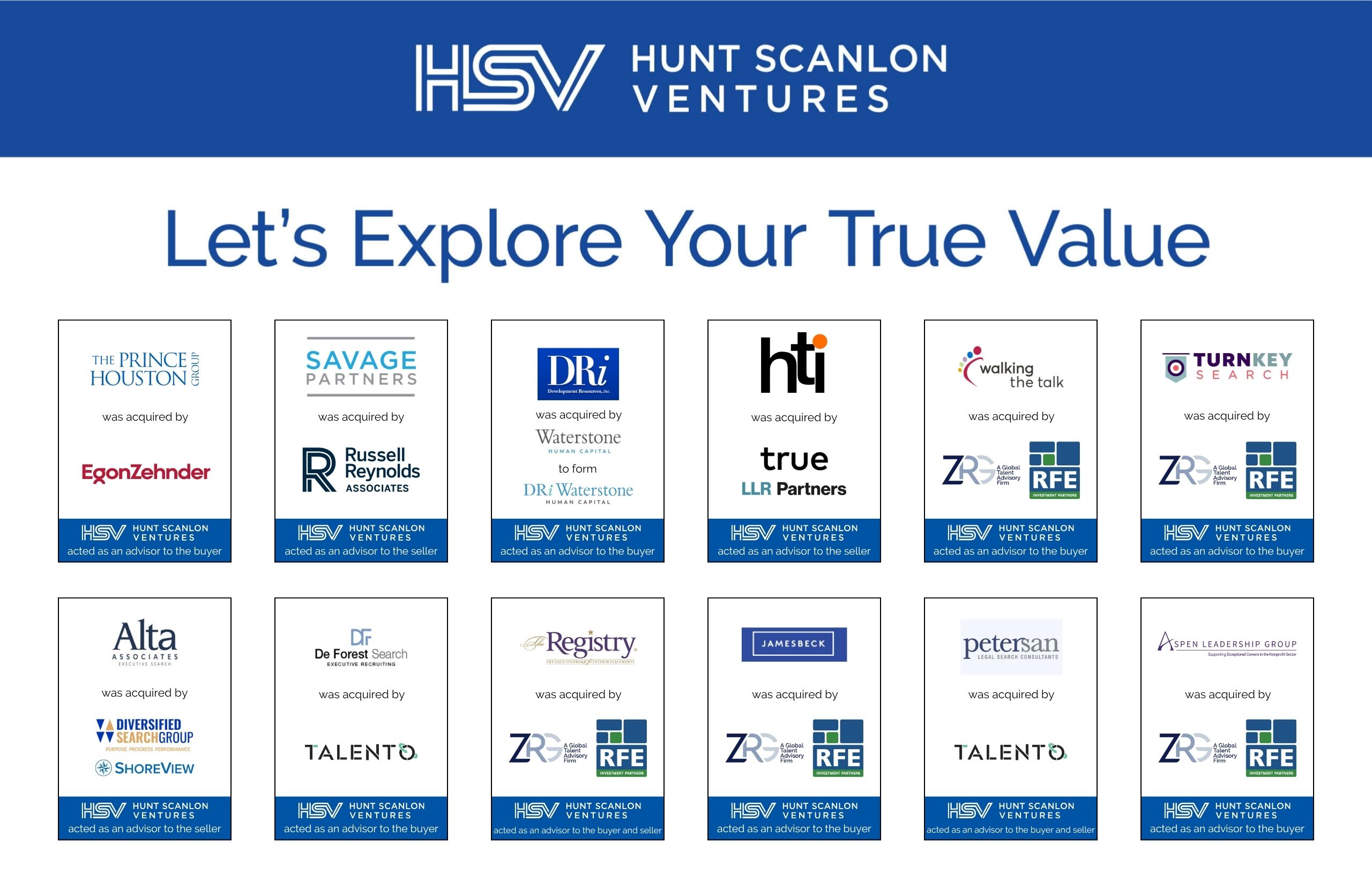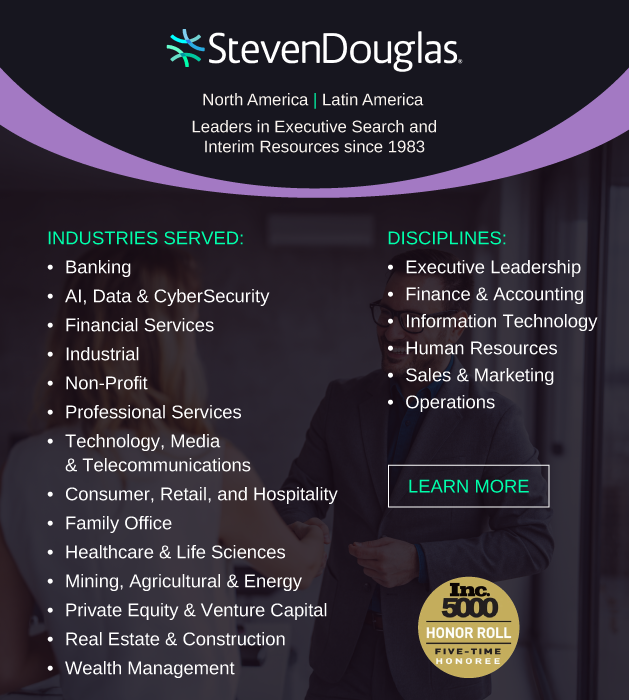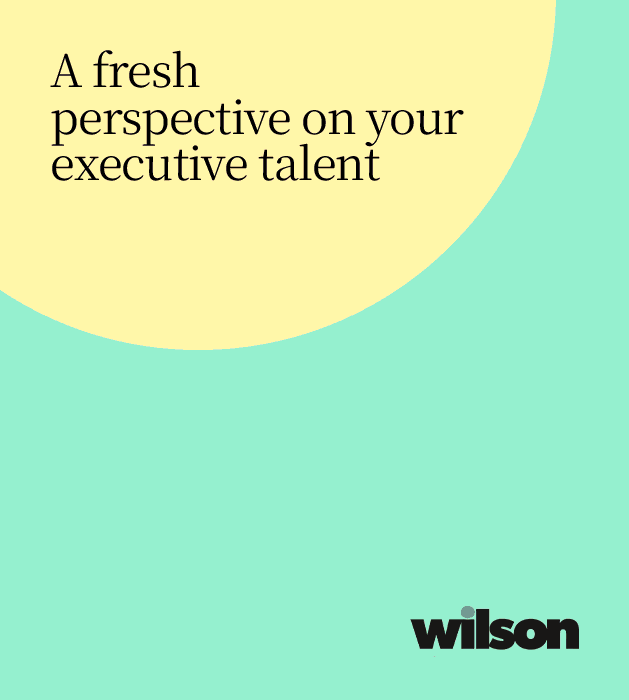Tobey Sommer spearheads human capital market analysis at Truist Securities. Armed with an MBA in finance from Vanderbilt University, Tobey has worked in the investment banking sector now for nearly 22 years.
Over that time, he has examined how investors, and Wall Street, assess and evaluate human capital service providers – including executive search firms which have been rapidly consolidating over the last several years – by examining key valuation metrics and associated risks that investors often examine when evaluating investments in the sector.
“When markets shift it can take a while for expectations to readjust and get back to a place where deals can be consummated more easily,” he said in this recent Q&A with ExitUp. “I think that’s where we are heading.”
That said, the opportunity for acquisitions in the human capital space lies in expansion to new verticals and diversification, he said – a trend seen with public search providers like Korn Ferry and Heidrick & Struggles, but also with large private recruiters including Russell Reynolds Associates and ZRG.
Even so, adapting to new and shifting market conditions will necessitate a more aggressive approach to sales by these companies. “Young professionals in this industry need to really cut their teeth and earn their keep,” Tobey noted in our interview. “The firms that enable this approach will come out on top.”
Below are excerpts from a recent discussion with Tobey that we think you will find insightful. The interview has been edited for length and clarity.
Tobey, what’s the human capital M&A landscape look like as we prepare to round the corner into the second half of 2023?

It is relatively slow right now as public company valuations have come down and interest rates have risen. Higher interest rates mean that PE firms can’t lever up quite as much and need to put in bigger equity checks. That said, the market hasn’t dried up completely. I just think more people are sitting on the sidelines and waiting until deals make more sense financially. Also, it is fair to say that there’s a bit of dislocation between public company multiples and private company expectations. When markets shift it can take a while for these expectations to readjust and get back to a place where deals can be consummated more easily. I think that’s where we are heading.
“It is fair to say that there’s a bit of dislocation between public company multiples and private company expectations. When markets shift it can take a while for these expectations to readjust and get back to a place where deals can be consummated more easily. I think that’s where we are heading.”
In a market that shifts so quickly like the one we’re in, what happens during ongoing deal discussions?
Ongoing deal discussions shift with the market. I’ve heard many stories about businesses that have been in the market for a period of time and are having to deal with negative revisions to their forecasts. That is such an important variable in terms of closing day. I had a conversation today about a company that has been in the market for over a year, touting a certain EBITDA and aspiring to sell for an even higher EBITDA level. They ended up at a substantially lower EBITDA than the original figure, let alone the aspirational goal. I could see the market picking up a little bit, but the larger rebound may remain over the horizon yet.
In the larger human capital space, where do you see opportunity for acquisitions?
I think, very clearly, the opportunity for acquisitions in the human capital space lies in expansion to new verticals and diversification. The companies that I cover have been acquisitive in new business lines and are likely to continue to be. This includes Korn Ferry, Heidrick & Struggles and ASGN. I’ve also seen a lot of action in the healthcare staffing space but that’s likely to slow down as we get further from the pandemic.
“Very clearly, the opportunity for acquisitions in the human capital space lies in expansion to new verticals and diversification. The companies that I cover have been acquisitive in new business lines and are likely to continue to be.”
Where will the companies that cover be looking to make additive acquisitions?
I think Heidrick will continue to assemble more businesses in the interim executive space, where they’ve made at least two acquisitions already. Korn Ferry could do the same, although their acquisitions have been more focused on the interim and professional search spaces. Specifically, I think they’d like to bulk up their IT offerings in the interim space. But while IT is generally considered a favorable vertical, market demand started to waver at the end of the first quarter when the bank failures were in the news.
Tobey, if there is an Achilles’ heel for human capital firms in this evolving new world order, what is it?
This is a great question. I was speaking to a private company this week and was told that ‘sales teams have forgotten how to sell.’ Recruiters can answer the phone but I’m not sure their fingers know how to dial right now. No one under 30 years old has ever seen a bad economy –discounting the very short 10 weeks when covid really crushed everything. It wasn’t that long ago that we were basically in the hottest recruiting market since after WWII, but that’s not the case anymore. Whether you’re at a staffing company or an executive search business, most young professionals have only seen easy days. Adapting to new market conditions will necessitate a more aggressive approach to sales. Young professionals in this industry need to really cut their teeth and earn their keep. The firms that enable this approach will come out on top.
“Recruiters can answer the phone but I’m not sure their fingers know how to dial right now . . . Whether you’re at a staffing company or an executive search business, most young professionals have only seen easy days. Adapting to new market conditions will necessitate a more aggressive approach to sales. Young professionals in this industry need to really cut their teeth and earn their keep. The firms that enable this approach will come out on top.”
What are the biggest changes you’ve seen in the human capital space?
One major change I’ve witnessed in the last five years has come in IT staffing. Customers of staffing companies are increasingly taking on consulting projects where they take responsibility for deliverables, as opposed to just supplying hours to say an organization like Accenture who would then provide the deliverable. In healthcare staffing I’ve seen the rise and now the uncertain future of managed service providers (MSPs). Hospitals have increasingly wanted to have a single provider, usually a staffing company but not always, to manage their staffing. The motivation was essentially to consolidate responsibility in the event of a staffing failure. The spike of the pandemic and the surge in pricing for temporary staffing has caused hospitals to reconsider this strategy. Hospitals are experimenting with lots of new ways to deal with staffing, so it will be interesting to see if a dominant strategy emerges in the next five years. The strategy that appears to have the most traction right now is a move to vendor neutral MSPs, as opposed to a staffing captive MSP. A major trend in the professional employer organizations (PEO) space, for companies like Paychex and TriNet, has been the emergence of co-employed service offerings bundled alongside non-co-employed administrative services organization (ASO) offerings. With these services you get your benefits from the PEO, but you don’t have to fully give up the keys to your car so to speak. This has been a popular offering … as not every small or medium-sized business wants to hand the management of their insurance, for instance, to an outsourced service provider.
What about changes in executive recruiting . . . what have you seen on that front?
In executive search, it’s been the growth of interim and an increase in diversification. Specifically in the case of Korn Ferry, they’ve pivoted their M&A strategy from consulting to focus more on the aspects of their business where they’ve had the most success cross-selling, which is in professional search. I’ve seen some very interesting trends in recruitment process outsouring (RPO). Search firms are still getting new sales and expanding their scope, but their customers are slowing their hiring. RPO contracts are not guaranteed; if your customer isn’t hiring, you’re not filling jobs or collecting fees. However, every time the economy slows it seems to add fuel to the RPO fire and elongates the list of companies that want to move to an RPO. This is an interesting trend because while a slowdown isn’t exactly good for current business, it does fuel the expansion of this service.
What excites you about the human capital space?
While I’m yet to form firm opinions yet, everyone is talking about the effect of AI on human capital. I’m interested to see how this incredible technology ends up being deployed. While the potential is clear, I don’t know what board is going to ask, “Who did chatGPT say we should hire?” I think there’s a liability and a reputational concern where you want to know who’s responsible for the search, and have that responsibility lay squarely on someone – a person – and not an algorithm. That said, AI will be an exciting development to watch in human capital.
Article By

Caleb Edmundson
Caleb A. Edmundson is Editor-in-Chief of ExitUp, the investment blog from Hunt Scanlon Ventures designed for professionals across the human capital M&A sector. Caleb serves as an Associate for Hunt Scanlon Ventures, providing robust industry research to support the firm’s investment group. Connect with Caleb.






